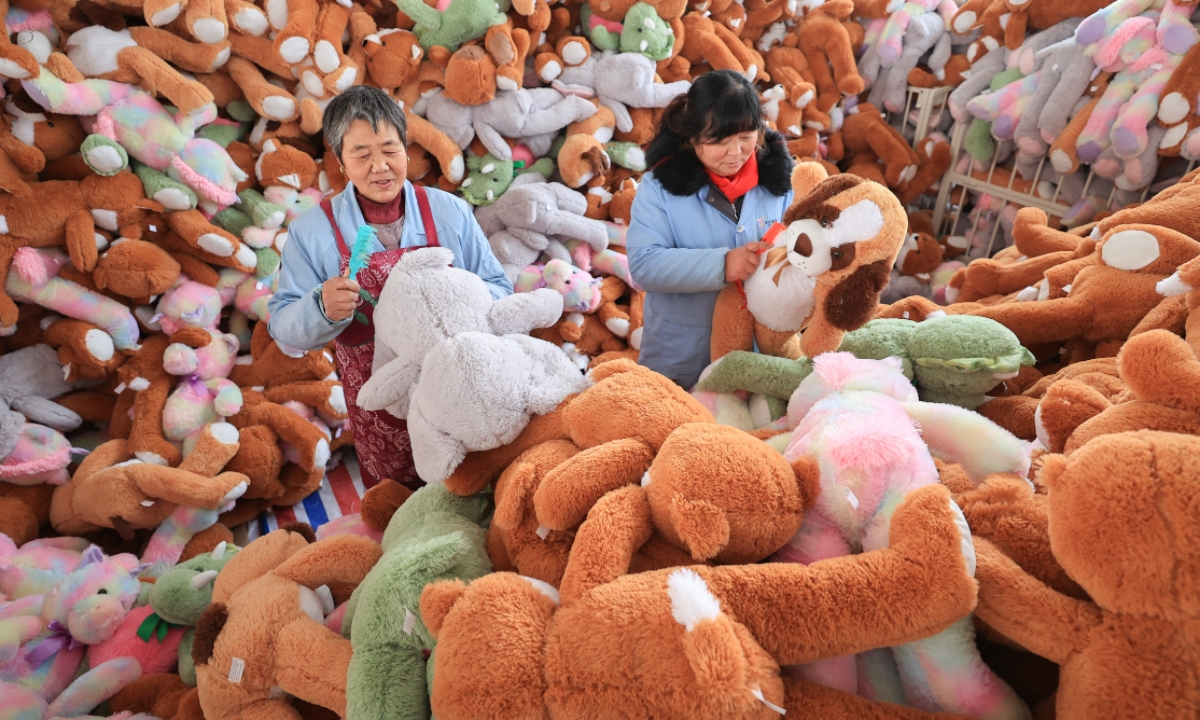
Workers rush to complete export orders at a toy manufacturing plant in Lianyungang, East China's Jiangsu Province, on January 2, 2025. Photo:VCG
When US parents head to the stores to buy toys for their children, they will likely see higher price tags, according to the head of China's main toy industry group.
The US administration has imposed so-called "reciprocal tariffs" targeting all products imported into the US. And it has imposed an additional tariff of 54 percent, including a 34 percent "reciprocal tariff" announced last week, against China, which is the biggest supplier of toys to the US market, according to media reports.
Following the tariffs, retailers are already renegotiating orders with suppliers, and US retailers and families will bear the brunt of Washington's additional tariffs, Liang Mei, president of China Toy & Juvenile Products Association (CTJPA), said in an interview with the Global Times.
If extra tariffs are imposed on Chinese toys, "manufacturers here cannot absorb the burden," Liang said. US retailers will shoulder part of the cost and the rest "will be passed on to American consumers," forcing families to buy either costlier products or cheaper, lower‑quality alternatives.
Higher pricesUS businesses have also warned of supply chain disruptions and higher prices for toys due to the US government's tariffs.
"Everyone is really in a scramble mode," Greg Ahearn, president and CEO of The Toy Association in the US, was quoted by CNBC as saying. "This is going to have massive negative repercussions for the consumer and for our industry."
Ahearn further pointed out that "you could have anywhere from 35 percent to potentially even a point-for-point price increase on products depending upon what margin those products run at," adding there could be a 50 percent price increase, according to the CNBC report on Friday.
China is the biggest supplier of toys to the US market, accounting for around 77 percent of the US' total imports, followed by Mexico and Vietnam, data from The Toy Association showed, according to the CNBC report. Both Mexico and Vietnam also face additional US tariffs.
In 2024, China exported $10.55 billion worth of toys (excluding games) to the US, up 4.2 percent year-on-year and accounting for 76.3 percent of total US toy imports, according to data from the CTJPA.
That partnership rested on a long‑standing WTO commitment to zero tariffs on toys. "Even during earlier tariff rounds, toys stayed duty‑free for both China and the US. This is the first time this industry faces a direct hit," Liang said.
Despite the uncertainty, she expects most US retailers and importers to keep sourcing toys from China, citing product quality, efficiency and market stability.
Relocating toy production outside China in the short term is unrealistic, Liang noted. Many US retailers and importers have cultivated long‑standing, stable partnerships with Chinese suppliers - some for two or three decades - built on tight coordination in quality control, pricing and delivery schedules. Finding equivalent partners elsewhere would be extremely difficult, Liang explained.
A large-scale move would pose immense logistical challenges and heighten product safety risks, Liang said, adding that as global trade conditions remain volatile, other potential manufacturing hubs are also feeling the impact of the US' tariff policy.
The US' "reciprocal tariffs" include a 10 percent tariff on all imported products and higher duties on many countries and regions.
Also signifying the negative impact of the US' tariffs on America companies and businesses are expected rises in prices of clothes and other products.
A senior analyst affiliated with the China National Textile and Apparel Council told the Global Times that Chinese apparel makers "cannot cut prices any further to offset US tariff bullying," adding that US buyers "will still rely on Chinese supply chains," so the extra costs caused by the US' "reciprocal tariffs" will land on American consumers.
In Jinhua, East China's Zhejiang Province, an exporter in the cookware sector, who requested anonymity, shared a similar view to the Global Times, saying that tariff‑related uncertainty is prompting many Chinese manufacturers to consider diversifying away from the US.
"If US clients stop buying from us, they won't find adequate substitutes. Building a supply chain is no easy job. Even in seemingly simple industries such as apparel, cookware, or insulated cups, the quality and supply capacity of Chinese products are unmatched. Ultimately, it will be American consumers who will pay more," the Jinhua exporter said.
Call for exemptionIn the global toy sector, major industry associations from many countries have jointly advocated for exemption from the tariffs.
In a statement on March 21, before the US announced the "reciprocal tariffs," The Toy Association, the CTJPA, and toy industry groups from other countries issued a statement, advocating to exclude toys from tariffs, noting previously established guidelines through the 1994 Uruguay General Agreement on Tariffs and Trade that have long recognized the essential nature of toys.
"Toys are essential products for childhood development and early education, and our industry works tirelessly to ensure these products remain safe and accessible," Kathrin Belliveau, chief policy officer at The Toy Association, was quoted as saying in the statement. "Working with toy associations around the world, we are reaffirming our aspiration for toys to remain tariff-free globally."
"Toys are necessities in a child's development. We hope the US, out of concern for children's welfare, will maintain its zero‑tariff policy on Chinese toys," Liang said. If tariffs push prices higher, she cautioned, families may cut back on purchases or be forced to buy more expensive products, undermining children's happy childhoods and healthy growth.




